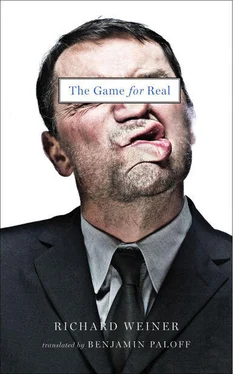“Please, sir, don’t trouble yourself. Did you sleep well?”
The word sir was not only a word, it immediately transformed into a cloud that you could see. But it was a light cloud, artless, unembittered, since it was a cloud for play-acting. Not much more had happened than the distance from was to is had grown slightly. He was no longer quite a Preissler youth, but you could see him better: sitting on a fairy-tale-white, unsaddled horse, holding it by the mane, he was naked. The white horse stamped at the maple shrub, moved off, softly disappeared. It left a virginal silence, it inserted the possibility of regret, that is, it also inserted memories, that is, the past. The present had washed away all imaginary boundaries. He had the silence to thank for that. It occurred to him that what he had just experienced happened to wise men all the time.
“Would you like to do me a favor? Don’t call me ‘sir.’ Talk to me naturally. I don’t call you ‘miss.’”
“As you wish, sir.”
“Not ‘as you wish, sir’; ‘as you wish.’”
“As you wish, then. — But if I’m to talk to you naturally, then you have to do the same with me. They call me Zinaida.”
“A name for a princess.”
“Around here, for a country girl.”
They looked into each other’s eyes, he sitting, she from above.
“No sir has ever ordered me to talk naturally before.”
She drew out the “sir.”
“But Zinaida — I’m not ordering you, I’m asking you.”
“How. . Darn!” (And quickly:) “How odd you are.”
She said no more. But everything she did next, be it gathering water, walking away, or balancing herself with her left hand at arm’s length, was different from what it would have been were he not here. He was sure of it. It was precisely and pleasantly according to a rhythm of which he was the sir, and the rhythm was that of the circulation of his blood. Even the fact of her having stopped halfway toward her departure— she’d stopped for nothing whatsoever — of her having turned, of her having smiled, was according to that rhythm’s will. And when she’d again gathered the pail and gone further, her distanced left hand swayed to that rhythm, to the rhythm of his blood. — –
That person is sitting on his bed, hugging his knees; a person sitting on a bed like this is a person awakened with a ready-made faith. The disinterestedly languid look of the person awakened with a ready-made faith has come to rest on his feet. The person has given his forehead a fleeting pass, bitten into his bottom lip, and said, scolding:
“But no. . it’s not true. Why say something that isn’t true? — Again: one more time!”
He stretched his left leg, propped himself on his left arm, sat a bit to one side. He was sitting sort of in mid-leap. He again stared into Zinaida’s name. Having firmly resolved to see beyond it. . “No cock-and-bull,” he said, “only what’s really beyond it, that and nothing more.”
Everything as it was initially: You can see him sitting by the pool; you can see Zinaida coming to fetch water. This time, however, he doesn’t make room for her.
“How did you sleep, sir?” the girl asks.
This time, no Gesslerian “would you care to do me a favor,” this time only the formally democratic: “Sir? You know, I’d rather you spoke to me naturally — simply by my name.”
“As you wish,” the girl answers through her teeth and almost shyly.
“I don’t know how to exteriorize,” the person sitting on the bed says bitterly, and he fixes his disappointed gaze on the sheet, “if I wanted her to speak to me naturally, I wanted it out of a fervent human need,” (he said “out of a fervent human need,” was ashamed for having said it, and relished his shame) “and look, it’s a wonder I wasn’t peeved to arrange it. Why peeved? As always — out of shame for my most noble feelings.”
Here, however, a grimace so overcame him that he released his right knee, too. He lay back down. He hissed, “But why am I lying? Again! I arrived the day before yesterday, in the dark. I got up. The window opens out to the meadows.” (He turned his head: the window really did lead out to the meadows. He turned his head away again, reassured.) “I was looking out the window. I saw the trail, the pool. I didn’t take the footpath; I wasn’t by the pool. Why would I have said I was by the pool if I wasn’t? I didn’t meet Zinaida there. She didn’t tell me that her name’s Zinaida. I know because it’s what they said when they called for her. When she first brought me lunch, I said to her, ‘Thank you, but you’ve forgotten the bread, Zinaida.’ And look, that’s how it was. So much for the idyll by the pool!”
The name Zinaida coiled up. It’s just a name. Not even that. They’re just letters of the alphabet.
To fix the future — alright then: let’s fix the future. Legal self-defense. For Christ’s sake, where would he draw his strength from if he couldn’t tell lies, if he were never allowed to lie to himself. . for instance, if he couldn’t lie to himself about plundering, about how he lives amid desolation, and this desolation can’t be dislodged.
Where would he draw his strength from were he never allowed to take a break from the certainty that if a dead-end street tapers so much that you can no longer even turn around on it, that if on that street, over and over, he must constantly confront this irrevocable, this hideous thing that lay in wait behind him, then it is he himself who is barring his way, with his deeds, with his selfishness, with his hard and wimpy intolerance. To spin a yarn about the future, fine: self-defense. But to do it with the past — cowardice! Not a yarn, a lie. But what a durable lie it is. It takes so much work to really tear it down. Who would have said that lies have such solid foundations? As though they weren’t even lies anymore. Maybe they’re just alternative truths? Truths that have been squandered. He sometimes knows simultaneously both how it was and how it ought to have been. But he only knows. He doesn’t recognize. What if what ought to have been was more real than what is? This eager, quiet, poetical youth by the pool! Why did that squandered potential have less of a right to be believed than an imposed necessity does? Either everything is questionable — and then questionable, too, would be the fact that he himself is — or else there is at least one reliable entity: him; but then he is both in his own fancy and in his own truth. Then nothing is in vain.
Not even the fact that in this numb awakening, that with the first frosty announcement of yesterday, he’d wanted Zinaida not to believe “it.” Which Zinaida — for are there so many, were there so many. .? The one that had laughed at him by the pool? But come now — that one’s been gone a long time, he’d finally, fearlessly, broken up with her.
Which Zinaida, then? Another one, an entirely different one: the sinister Zinaida, the one no one would steal away from him; the Zinaida of early evening; the Zinaida shuffling toward the table where he is waiting for his supper; the Zinaida carrying a writing pad, and on it an inkwell, pen, and registration form; the Zinaida whom he asks: “What’s the hurry? Right before supper?” The Zinaida who is standing with her back to him and answering in a rasping voice: “Yes — yes — a hurry — the master said right away, sir”; the Zinaida with those slightly bowed arms, which she twitches; an animal, you’d say, on an oppressive chain.
The person on the bed bared his teeth and angrily nodded his head.
At last, he’d grasped the true beginning. Now post-haste, yes? Now post-haste.
And for starters: how could he drop everything and go out to the yard? A beautiful excuse: he couldn’t, it would seem, surmise. . Ridiculous! He surmised quite well. Still, he was at the point where the first little flames of alarm flared up. And yet, he was the only one there. The sole outside witness. The fact that he loathed the ostentatious manners of the Steels, is that any excuse? Those extravagant manners of theirs! Only he would have to watch himself with these extravagant manners! It’s not so certain that he had loathed these people immediately upon seeing them from the table, as they were driving in. It’s quite possible that he had been utterly indifferent to them. That they hadn’t had extravagant manners whatsoever. It cannot be exluded that he is now, yet again, reaching out for some “mitigating circumstance.” He knows them, these jolly old mitigating circumstances of his, his supplementary moral alibis. He would have to watch himself; he knows how things go with these deceits: they’re as indispensable to him as a snare to a poacher.
Читать дальше












